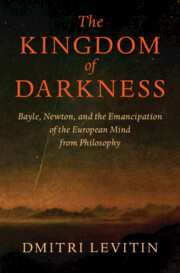
- Cited by 6
-
Cited byCrossref Citations
This Book has been cited by the following publications. This list is generated based on data provided by Crossref.
Malara, Ivan 2022. Encyclopedia of Renaissance Philosophy. p. 1.
Malara, Ivan 2023. Encyclopedia of Renaissance Philosophy. p. 1.
Mills, R. J. W. 2023. Religion and the Science of Human Nature in the Scottish Enlightenment. p. 297.
Mills, R. J. W. 2023. Religion and the Science of Human Nature in the Scottish Enlightenment. p. 149.
Mithen, Nicholas 2024. ‘What was moderate about the enlightenment?’ Moderation in eighteenth-century Europe. History of European Ideas, p. 1.
Castel-Branco, Nuno 2024. Thinking the Earth with the Body: How the Anatomist Nicolaus Steno (1638–1686) Read History in the Earth’s Strata. Isis, Vol. 115, Issue. 2, p. 312.
- Publisher:
- Cambridge University Press
- Online publication date:
- March 2022
- Print publication year:
- 2022
- Online ISBN:
- 9781108934152




